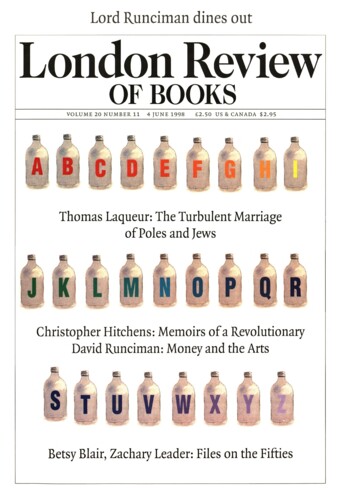Onomastics: William Boyd
Alex Ivanovitch, 4 June 1998
‘Names are important,’ someone says in Armadillo, William Boyd’s seventh novel. The line crops up a few times elsewhere in Boyd’s books, as do characters who show some sensitivity to the tricky business of naming. ‘What if we hadn’t had such great names?’ Frank O’Hara wonders in Nat Tate, the hoax biography that took in much of New York’s art establishment a few weeks ago: ‘what if we had been called Gilbert Kline, Jonathan Pollock, Cyril O’Hara, Jennifer Krasner, Timothy Rivers, Philip Tate?’ The question is left hanging but the answer, in Tate’s case, is that this little practical joke would surely have gone out into the world without its best gag. Had the guests at Modern Painters’ New York party read The New Confessions, for example, they might have remembered that Boyd was the sort of writer who could call a man with bad skin Hamish Malahide, and a German private eye Eugen P. Eugen. Nat Tate’s name is not exactly a giveaway, but it’s certainly the sort of joke Boyd’s readers have come across before. It’s appropriate that a nasty verbal ghost should have taken up residence in the name of a painter haunted by die fear of being second-rate, but the allusion to the word ‘tat’ in both parts of his name ought to have alerted the partygoers.‘

